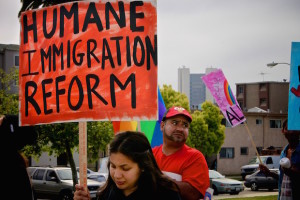You have no items in your cart. Want to get some nice things?
Go shopping
“Four immigrants were found suffocated in the back of a Tesco lorry. Every little helps.” Do you find that ‘joke’ funny or shocking? It popped up on my Facebook timeline last week. More frightening for me than the joke itself? Many people had clicked ‘like.’ If jokes like this are appreciated and found amusing, we seem to be void of humanity, compassion and companionship.
If there’s one thing Brits seem to have a real problem with, it’s people entering the country. The monumental support of anti-immigration campaigns alongside the many not so quiet murmurs that Britain is for British people and that jobs in Britain are for British people, proves this. Right now we’re dealing with the ridiculous migration situation in Calais. But do we think that the amount of migrants trying to cross the border is ridiculous, or the measures taken by Cameron to stop these attempts are ridiculous? If what resonates with us is the first option, why is that? Perhaps it is due to the media. They have whipped up a flurry of stories to implant fear into their audience. The negative narrative we are spoon-fed daily regarding immigrants, “immigrants steal our jobs, immigrants steal our homes and immigrants ruin our country, we need to get them out!” paints a bleak and scathed picture of the reality and doesn’t usually give any other perspective.
In 2014 England received 31,400 asylum applications, while Germany received 166,800, five times more. Nearly 5.5 million British people live abroad. Misleading data and confusion makes it difficult to conclude a set amount, but surprisingly for some, between 1995-2011 EU immigrants have made a positive contribution to the UK. The idea that immigrants use all of the UK’s benefits is also a myth. In 2014 92.6% of working age benefit claims were British, while 2.5% were EU nationals and 5% were recipients outside the EU, the Department for Work and Pensions and HMRC published. If these figures were shared alongside the news reports about how immigrants are swarming, as David Cameron put it, would we have a different opinion on immigration?
The media rarely tells us how immigrants benefit the UK. We aren’t told that 26% of NHS doctors are foreign-born. The BMA stated that “many NHS services would struggle to provide effective care.” This may be very cynical of me, but maybe once an immigrant is newsworthy for a positive reason their immigrant label is publically removed and they are deemed a ‘normal’ citizen. We also aren’t regularly informed as to why these people want to come to England, nor are we told why they are leaving their native country. We probably aren’t even interested. We often fail to realise how desperate some of them are. Why would people be living in sheer squalor in Calais if they had another option? If England was in crisis, struggling with genocide and war, I’m sure many would want to flee. Their situations are appalling and devastating, yet, to use stereotyping in the same manner that Britons use against immigrants, we sip our tea and munch our freshly baked scones while discussing how awful it is that these people are trying to enter our beloved country. How dare they risk their lives to come here. Unfazed by their desperation, indifferent as to whether they live or die, Britain dehumanises these people. Cecil the lion got more coverage, compassion and support than the men who died horrific deaths trying to cross the border, a difficult realisation to stomach.
It is an inconvenience for Britain to have to deal with immigrants. The complaint that immigrants take up jobs seems invalid, ignorant and lazy. Instead of complaining that immigrants take jobs that the British should be entitled to, why not prove that we’re as hard working and professional, and are the right people for the job? The constant criticism that surrounds immigrants hints at a damaging and malicious hierarchical structure in England. What about British ‘expats’? Immigration is not a one-way thing. Many British people live abroad, they are also immigrants, yet are not named, seen or treated as immigrants. As I mentioned earlier, 5.5 million Brits live outside of the UK, but these people are not reprimanded, they are living the high life as ‘expats’.
Is the fear mongering about immigrants linked to the surge of people wanting out of the EU? Britain doesn’t seem to want to be part of a wider or European community, it doesn’t appear to want to share or help, but instead guards itself from any potential danger, such as immigrants. It could be described as political realism, as England seems to be predominantly concerned with upholding national interest, not the interest of others. Of course Britain must safeguard itself, but to what extent? When does it become immoral and inhuman? I think we have crossed the line. We need to change our views. The word immigrant is loaded with stereotyping, negativity and spite. We should think that every little helps, but in favour of humanity, in favour of those in need.

About Isabel Gonzalez-Prendergast
Isabel is particularly interested in international literature, learning about different cultures and philosophies.




